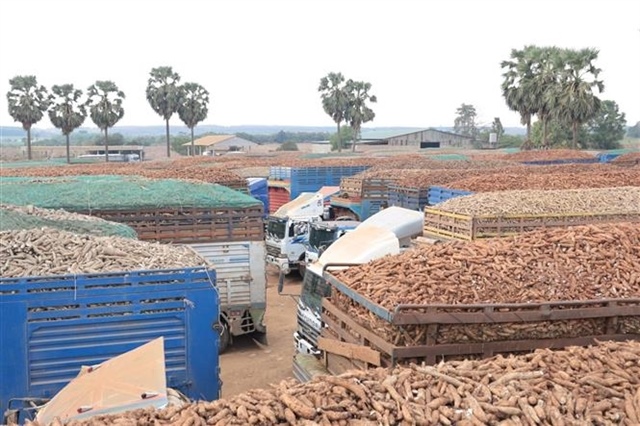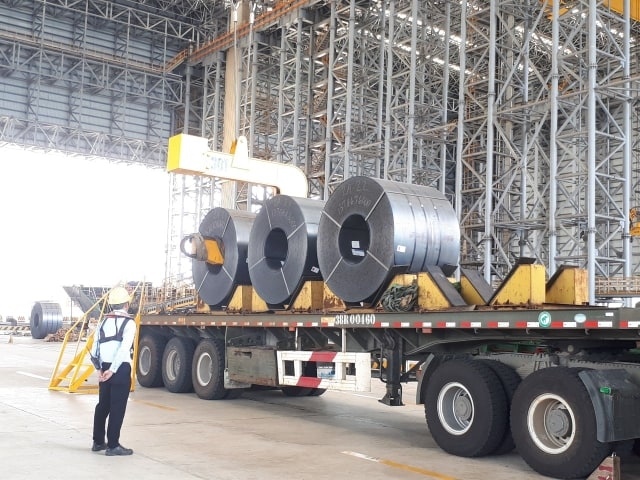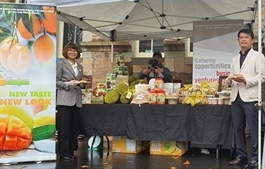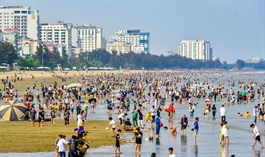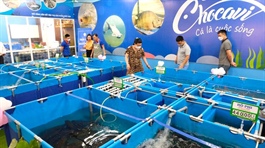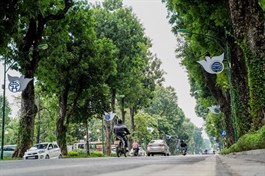Vietnamese firms in trouble due to dearth of material imports from China
Vietnamese firms in trouble due to dearth of material imports from China
Many Vietnamese enterprises are facing issues as material imports from China have not been shipped to Vietnam over the past three months because of a COVID-19 lockdown in many parts of the neighboring country.

The risks of production disruptions and capacity reduction, which may lead to a delay in the completion of orders, put considerable pressure on the businesses.
Interminably waiting for goods
T.V.H., general director of a truck manufacturing and assembling company in Cu Chi District, Ho Chi Minh City, said a shipment of auto parts from China has been delayed for three months, which has resulted in the tardiness of the company’s truck manufacturing and delivery.
It normally takes 1.5-2 months to receive the goods but no one knows how long it might take this time.
The company is waiting for parts to assemble trucks. Supply chain disruptions have caused multiple difficulties for businesses, H. added.
These cases have become a popular topic on logistics forums.
Many businesses complain about the shortage of accessories and maintenance equipment imported from China, which may damage the prestige of the enterprises and even cause them to be fined for failing to implement contracts.
The hold-up is occurring at both water and road border crossings, impeding the shipment of goods from China to Vietnam.
On April 18, a representative of logistics firm Best Express said that the China-Vietnam cargo transport route which was opened last year is now closed as part of China’s epidemic control measures.
Tran Van Hao, director of Thai Viet China Transport Joint Stock Company, which specializes in transporting materials to large electronic groups in Vietnam, divulged that a foreign-invested firm in Vietnam even chartered 60 flights to transport parts and equipment from China because of the road transport disruption and impediments to customs clearance.
Thus, the firm faced a cost overrun.
Lack of work
Dap Cau Garment Corporation Joint Stock Company, which specializes in garment outsourcing for large markets, has 80 percent of its materials imported from China as required by its partners.
However, the company merely received around 60 to 70 percent of the materials needed for orders in the second quarter.
Dap Cau director Nguyen Duc Thang said goods and materials from ports in Shanghai have yet to arrive in Vietnam over the past month as the city is under lockdown over rising coronavirus infections.
Vietnamese enterprises must divide orders into smaller ones and distribute them to production teams to ensure jobs for workers, leading to low productivity.
Thang added it was impossible to seek new material suppliers in a short period as China is the world’s factory, which supplies a wide variety of materials at reasonable prices.
Meanwhile, the majority of materials imported by Dap Cau are required by its partners.
As for orders with insufficient materials, the firm has been negotiating about a delay in the delivery time but it should not be delayed for too long.
“Enterprises have faced multiple risks in payment and late shipment and found it difficult to recover after the pandemic,” Thang said, proposing the state provide market information to help them secure new orders and diversify their material sources.
According to Phan Thi Thanh Xuan, vice-chairwoman and general secretary of the Vietnam Leather, Footwear, and Handbag Association, up to 70 percent of the footwear sector’s materials are shipped from China so the large-scale lockdown has caused supply disruptions.
In addition, high transport and logistics costs hinder enterprises from completing orders.
A representative of the Industry Agency under the Ministry of Industry and Trade told Tuoi Tre (Youth) newspaper that the agency had asked associations and companies to carefully review the impact of China’s lockdown policy.
However, they should take the initiative in adapting to the country’s zero-COVID strategy.
Besides providing market information and connecting supply and demand, the Ministry of Industry and Trade will seek new markets to help Vietnamese businesses reduce their dependence on certain countries in both importation and exportation.
The ministry will take full advantage of the benefits and commitments in free trade agreements to which Vietnam is party.
It also encouraged enterprises to enhance the research and design of new products, reduce outsourcing, take the initiative in material supplies, and diversify export markets.
Increasing and unstable transport costs
Vo Thi Phuong Lan, chairwoman of ASL Logistics Company, said international transport costs would remain unstable as the global port congestion remains rampant, especially at large ports in China and the U.S..
Fuel price hikes and many other issues have caused a spike in domestic transport costs in the first quarter of the year, up 27 percent over the last months of 2021.
The increase is beyond the control of all logistics firms.
According to logistics experts, international transport costs will remain volatile.
This year, the expenses may fall over last year. However, it is extremely hard to reach the levels in 2019-20.
Saigon Newport Corporation has liaised with other companies on improving the digital ecosystem and arranging many depots in Binh Duong and Dong Nai Provinces to connect with Cat Lai Port in Ho Chi Minh City and Tan Cang-Cai Mep Terminal in Ba Ria-Vung Tau Province in a bid to cut transport costs by 10-30 percent.
Failing to set delivery time
Nguyen Thanh Trung, a representative of the Logistics Association of Ho Chi Minh City, told Tuoi Tre that cargo ships getting stuck at China’s ports remains a serious issue.
Export firms face a shortage of empty shipping containers while incurring high transport costs.
As a result, they cannot set a specific time to deliver goods to their partners.
China is striving to remove the bottlenecks. With hundreds of ships waiting to enter ports, it will take two to three months to clear the backlog of cargo at ports after China scraps the zero-COVID policy, Trung said.
Vietnam exported US$56 billion worth of products to China and spent some $110 billion on imports from the neighboring country, up 14.5 percent and 30.5 percent, respectively, over 2020, according to the General Department of Vietnam Customs.
In the first quarter of this year, the export revenue from the Chinese market reached $13.7 billion, while the import turnover was $23.8 billion, rising 9.2 percent and 47.3 percent, respectively, year on year.





